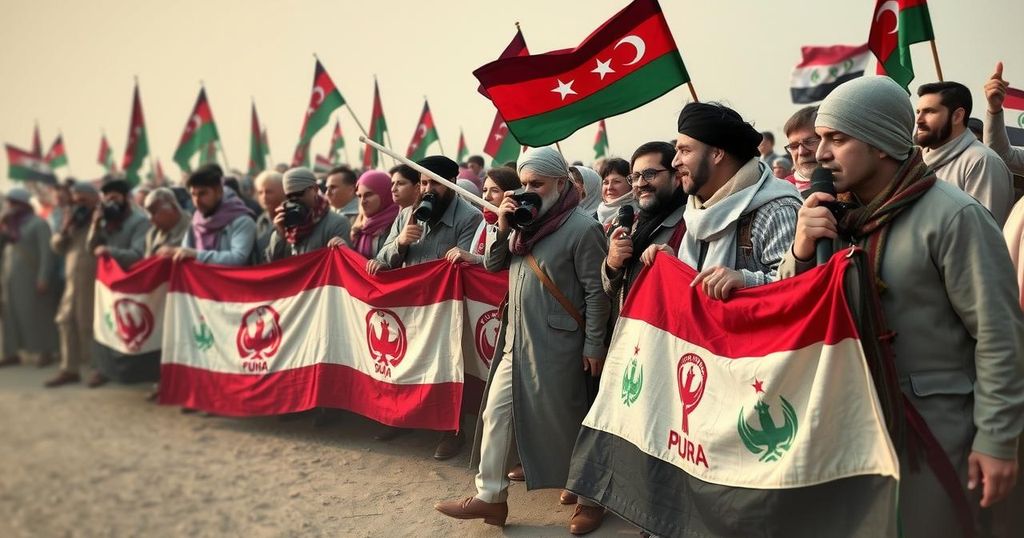Kurdish leaders in Syria are working towards establishing a unified delegation to represent their interests in negotiations following Assad’s regime’s fall. Despite historical divisions between groups like the SDF and ENKS, recent discussions seek to address internal grievances and outline a cohesive stance for minority representation in the new Syria. International stakeholders encourage reconciliation, while concerns over the threat posed by emerging Islamist authorities linger.
Despite significant internal divisions, Kurdish leaders and analysts are striving for a consolidated delegation to articulate their concerns in negotiations with Syria’s new authorities following the fall of Bashar al-Assad. The Syrian Democratic Forces (SDF), closely allied with the United States, have governed northeast Syria since 2012, primarily under the Democratic Union Party (PYD), despite Turkey’s classification of these groups as extensions of the PKK, a designated terrorist organization.
This week, the Kurdish National Council (ENKS) and the SDF convened with U.S.-led coalition officials to deliberate on forming a united Kurdish stance in the context of a new Syria. The ENKS, representing the opposition to PYD’s dominance, aims to address past grievances, including targeted actions against its members. ENKS President Sulaiman Oso emphasized the critical need for internal resolution to achieve a unified front before addressing broader issues in Damascus.
Oso highlighted that recent dialogues have opened avenues for transparency and mutual understanding; however, trust remains fragile. The discussion underscored international stakeholders’ encouragement for the Kurdish factions to reconcile swiftly.
Senior PYD official Saleh Muslim posited that a cohesive Kurdish delegation, inclusive of Arabs and Christians, is essential to authentically represent the region’s demographic diversity. Although ENKS has dispatched representatives to Damascus, they are conducting dialogues with community leaders rather than the governing authorities.
Concerns regarding inadequate Kurdish representation in the new political landscape were echoed by analysts warning that Kurdish aspirations might be overlooked by emerging Islamist authorities. Observers stress the urgency of constructing a robust and unified political presence for the Kurds to secure their rights and voice. The discourse surrounding federalism has emerged among Kurdish groups, yet a clear, articulated strategy remains absent, necessitating the incorporation of knowledgeable civil society leaders into the delegation to convey their collective demands effectively.
The ongoing challenge for the Kurdish factions hinges on the imperative of unity amidst historical chances for political advancement in post-Assad Syria, calling for decisive action from relevant stakeholders to guide these discussions toward meaningful outcomes.
The Kurdish regions in northeastern Syria have been shaped by ongoing conflict, particularly since the Syrian civil war intensified in 2012. Control by the Syrian Democratic Forces (SDF), backed by U.S. forces in the fight against the Islamic State, has been marked by tensions with Turkey, which perceives Kurdish groups as threats linked to the PKK. The Kurdish National Council (ENKS) offers a counterweight to the PYD’s governance, fostering a delicate relationship with Turkey and attempting to assert its influence in the evolving political landscape. The recent discussions among Kurdish factions in the context of Syria’s changing political dynamics are critical, as these factions seek to achieve representation and safeguard their interests against dominating Islamist authorities while navigating lengthy grievances. The involvement of international actors, such as the U.S., U.K., and France, indicates a broader interest in ensuring the representation of minority groups in post-Assad governance.
In conclusion, the pursuit of a unified Kurdish representation in post-Assad Syria is crucial for articulating the community’s political aspirations and safeguarding their rights amid emerging authorities. The internal rifts between the PYD and ENKS pose challenges to such unity. Nonetheless, proactive dialogues facilitated by international stakeholders underscore the urgent need for collaboration. It remains to be seen whether Kurdish groups can successfully navigate these complexities to achieve a strong, representative political presence in Damascus.
Original Source: www.voanews.com






